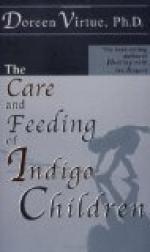Often serious injury is done to the elbow or shoulder joints.
THE TEMPERATURE
What is the normal temperature of an infant?
The normal temperature varies more than in adults. In the rectum it usually fluctuates between 98 deg. and 99.5 deg. F.; a rectal temperature of 97.5 deg. F. or of 100.5 deg. F. is of no importance whatever unless it continues.
Where should the temperature of infants and young children be taken?
The rectum is altogether the best place, and next to this the groin. The rectal temperature is from half a degree to a degree higher than that in the groin.
How long should the thermometer be left in place to take the temperature?
Two minutes in the rectum, and five minutes in the groin.
Is the temperature of a young child a good guide as to the severity of its symptoms in illness?
As a rule it is. A temperature of 100 deg. to 102 deg. F. commonly means a mild illness, and one of 104 deg. F. or over a serious one. The duration of the fever is, however, even more important than the height of the temperature. It should be remembered that in all young children slight causes often produce a high temperature which lasts for a few hours; one should not therefore be unduly alarmed unless the temperature continues high, or is accompanied by other important signs of illness.
Is not a high temperature a more serious symptom in a young child than in an adult?
The opposite is rather the case. Young children are extremely sensitive to conditions which produce fever, and the thermometer often gives an exaggerated idea of the severity of the symptoms. A cause which in an adult might produce a temperature of 102 deg. F. or 103 deg. F., in a young child would very likely be accompanied by a temperature of 104 deg. or 105 deg. F.
NERVOUSNESS
What are the principal causes of excessive nervousness in infants and young children, and what can be done to prevent this?
The most important cause is the delicate structure of the brain at this time, and its rapid growth. It grows as much during the first year as during all the rest of life. This requires quiet and peaceful surroundings. Infants who are naturally nervous should be left much alone, should see but few people, should be played with very little, and should never be quieted with soothing sirups or the “pacifier.”
At what age may playing with babies be begun?
Babies under six months old should never be played with; and the less of it at any time the better for the infant.
What harm is done by playing with very young babies?
They are made nervous and irritable, sleep badly and suffer from indigestion and in many other respects.




